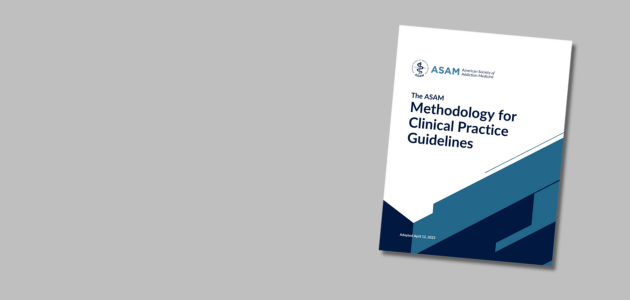Introduction
In keeping with the ยายืสำฦต’s (ยายืสำฦต) mission to define and promote evidence-based best practices in addiction prevention, treatment, remission, and recovery, ยายืสำฦต Quality Improvement Council (QIC) sought to rigorously update and structure ยายืสำฦต’s Clinical Practice Guideline (CPG) methodology. The QIC recognized a need for ยายืสำฦต’s CPG methods to be more in line with international standards for CPGs such as:
- Establishing improved transparency
- Managing conflicts of interest
- Balancing guideline group composition
- Using a rigorous systematic review
- Establishing quality of evidence
- Determining the strength of recommendations
- Articulating recommendations clearly and succinctly
- Engaging stakeholder review
- Promoting diversity, equity, and inclusion · Establishing a process for CPG updates
Over a two-year process, ยายืสำฦต worked to create this new methodology which will inform how future ยายืสำฦต CPGs are conducted.
Download
The methodology is available in two formats. For all methodology details and appendices, see the Full Methodology. For a summary document published in Journal of Addiction Medicine, see Summary Methodology.
Methodology
In January 2021, the ยายืสำฦต QIC developed the “Clinical Practice Guideline Methodology and Oversight Subcommittee” and chose Dr. Melissa Weimer to lead this subcommittee. The CPG-MOS was charged with providing strategic oversight to the development, implementation, education, and communication of CPGs. The goals of the CPG-MOS were to establish and publish a methodology for the development of CPGs and to develop a CPG strategic plan.
Through an open call process, ยายืสำฦต members were invited to apply for consideration to serve on the CPG-MOS subcommittee. The seven members chosen represent individuals from diverse backgrounds, geographies, research experience, and clinical backgrounds.
Each individual CPG methodology underwent evidence review, subcommittee deliberation, and consensus. The CPG-MOS subcommittee presented all proposed methodology for review, deliberation and approval to the ยายืสำฦต QIC. When needed, other ยายืสำฦต committees such as the ยายืสำฦต Ethics Committee were engaged for review, deliberation and approval.
In the process of CPG methodology development, it became clear that other non-CPG clinical practice documents may be relevant for ยายืสำฦต to develop. To promote best practices that remain evidence-based and can be more efficiently produced, the CPG-MOS and the QIC also developed a framework for new clinical documents described here as Clinical Guidance Statements and Clinical Considerations. These clinical documents will have less methodological rigor than the CPG, but will allow ยายืสำฦต to respond in a timely manner to urgent clinical concerns from its members and the public.
The ยายืสำฦต CPG Methodology will be reviewed every 5 years by the QIC for updates.
Authors: Members of the ยายืสำฦต Clinical Practice Guideline Methodology and Oversight Subcommittee (CPG-MOS)
Chair: Melissa B. Weimer, DO, MCR, DFยายืสำฦต
Members: Emily Brunner, MD, DFยายืสำฦต, Devan Kansagara, MD, Todd Korthuis, MD, MPH, Fยายืสำฦต, Lewis S. Nelson, MD, MBA, Fยายืสำฦต, Darius Rastegar, MD, Fยายืสำฦต, Audra Stock, MA, Carlos Tirado, MD, MPH, Fยายืสำฦต
ยายืสำฦต Staff: Amanda Devoto, PhD, Taleen Safarian
Consultant: Bethea A. Kleykamp, PhD

